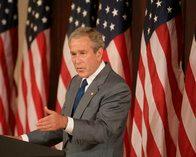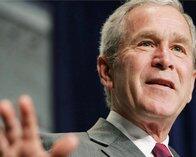38% Say U.S. Will Be Less Safe Following Iraq Troop Withdrawal; 17% Say Nation Will Be Safer
Thirty-eight percent (38%) of American adults believe that the withdrawal of combat troops from Iraq will make the U.S. less safe than it is today.

Thirty-eight percent (38%) of American adults believe that the withdrawal of combat troops from Iraq will make the U.S. less safe than it is today.

Fifty-one percent (51%) of American voters say that the United States should wait for the September progress report before making major policy changes in Iraq.

A Rasmussen Reports survey on perceptions of media bias found that Americans tend to believe that the New York Times, Washington Post, and their local newspaper all show a bias in favor of liberals.

Americans are evenly divided as to whether or not the government should “require all radio and television stations to offer equal amounts of conservative and liberal political commentary.”

By a 39% to 20% margin, American adults believe that the three major broadcast networks deliver news with a bias in favor of liberals.

Forty-three percent (43%) of Americans believe Congress is legitimately trying to find information about the firing of U.S. attorneys.

Forty-five percent (45%) of American voters expect sectarian violence in Iraq to increase if U.S. combat troops are withdrawn.

Just 19% of American voters believe that the U.S. troop surge in Iraq was a success. A Rasmussen Reports national telephone survey found that 43% of voters consider the surge a failure.

Following the Live Earth concert, 33% of Americans say they followed news coverage of the event Somewhat or Very Closely.

Thirty-nine percent (39%) of Americans now believe that President Bush should be impeached and removed from office.

Just 21% of Americans agree with the President’s decision to commute the prison sentence of I. Lewis “Scooter” Libby.

Senators up for re-election in 2008 overwhelmingly aligned themselves with public opinion during the recent immigration debate.

Most American voters (53%) say that Democrats in Congress have not done “enough to change President Bush’s policies in Iraq.”

Scott Rasmussen’s first law of politics is that America’s politicians aren’t nearly as important as they think they are.

One aspect of the immigration debate currently churning in the Senate is that few people are paying attention to anything else the nation’s legislators are doing. Last week, the Senate passed energy legislation and no one noticed.

As the Senate prepares to resume debate the “comprehensive” immigration reform bill, the legislation continues to face broad public opposition

Forty percent (40%) of American voters say that President Bush is doing a good or an excellent job on taxes.

Just 20% of American voters want Congress to try and pass the immigration reform bill that failed in the Senate last week.

Iraq, the issue that enabled the Democrats to regain control of Congress, remains among the most partisan of issues in the United States today.

Elite newspapers and countless bloggers are writing their own explanations of why the compromise immigration legislation failed last night.